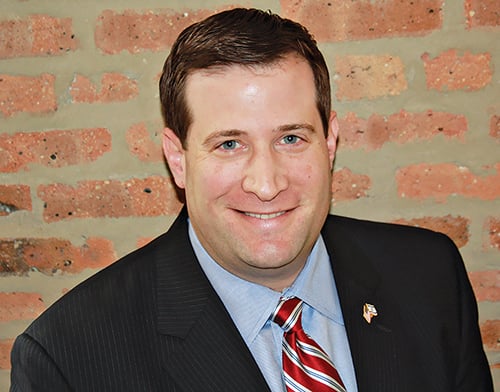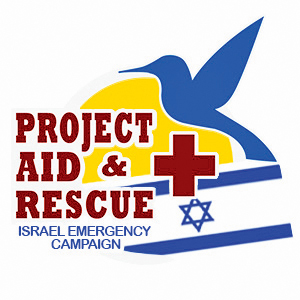
What began as a scattered effort by individuals wishing to address Israel’s overwhelming medical needs has morphed into a well-oiled machine of volunteers who are making an impact. Many of them reside in Bergen County.
Project Aid & Rescue (PAR) was initially created 18 months ago—well before the current situation—with the aid directed at Ukraine, not Israel. It was the brainchild of Jeff Kaminsky, who resides in Northbrook, Illinois. As a person never known to sit idly by, Kaminsky, a volunteer first responder at the Northbrook Fire Department, was appalled at Russia’s attack on Ukraine. He flew to Berlin to assist Ukrainians fleeing the war and worked with others to provide housing, food and medical supplies, founding PAR after returning home. He put his own manufacturing business on hold and was involved in fundraising as well as the logistics of shipping medical supplies by air and sea to frontline hospitals. One of his colleagues at PAR Ukraine, Mika Harari of Germany, has also become involved in PAR Israel and was instrumental in securing ambulances for Magen David Adom.
When asked by The Jewish Link what made him switch gears towards Israel, Kaminsky replied “October 7 happened. It was a no-brainer. I’m Jewish.” Meanwhile, a few short days after the attack, a group of Bergen County professionals, mostly in the medical field, formed a loose alliance with the goal of securing supplies for Israel. Teaneck’s Yael Kramer, who founded the group, is director of operations for a division at Hackensack Meridian Health, and was able to secure medical supplies from her hospital system. A few days later, Naomi Noble of Fair Lawn, an ICU nurse at NYU Langone, who had also reached out to her employer, received word that it would be willing to donate 40 pallets, which arrived by chartered flight within the first few weeks of the war. Tomer Shalom, an Israeli currently residing in Fair Lawn, who, like Noble, is a member of Shomrei Torah, has been heavily involved in critical logistics for the operation, overseeing management of the project from request to fulfillment. A host of others, many of whom continue on as task force members, have contributed untold hours since the war broke out.

Initially, the Bergen County team secured whatever items they could get their hands on and shipped them to Israel by any means available. They communicated through a hastily formed WhatsApp group. This proved to be inefficient as various items shipped overseas were not essential while others involved a duplication of efforts for the same item/facility due to communication shortfalls. The New Jersey contingency knew they needed to shore up their operations. Fortunately, Kaminsky had worked with Arielle Setton of Bergen County, executive director of Tikva Odessa Children’s Home in Ukraine and a member of PAR’s board. She also happened to know Yael Kramer. One thing led to another. The Bergen County team was merged into PAR Israel, but runs as a totally separate entity from PAR Ukraine.
The overarching goal of PAR Israel is to support Israeli hospitals, first responders and medical teams as emergency needs arise. Kaminsky explained that although the situations in Israel and Ukraine often involve a different set of requirements, having experienced the sourcing, logistics and red tape associated with aid for Ukraine for well over a year “was an internship for Israel.”
The effort was further optimized when Tomer Shalom introduced Monday.com, an Israeli startup that provides a powerful data infrastructure to manage the most complex of workflows. It helped clear the channels of communication so that requests from Israel were prioritized by urgency, correctly sourced, then shipped, tracked and properly documented so that equipment would arrive swiftly and reach its intended destination without being held up at airports or loading docks.
Kaminsky shared that successful achievement of the team’s goals has much to do with developing a deep system of contacts. Early on he was put in touch with the minister of health at the Knesset. Two days later he was connected with the head of supplies and logistics at the newly formed Emergency and Disaster Response Task Force. He asked, “How do we get aid in—what’s the process?” She responded, “We don’t have one.” He was confused until she explained. “We are Israel. We are used to sending aid out, not bringing it in.”
Monday.com has gone a long way towards addressing the various processes. Two dozen Israeli hospitals, along with Magen David Adom, United Hatzalah and frontline field units are included in the database. Requests are entered and confirmed, then matched with participating hospitals and medical suppliers in the U.S. and sometimes abroad. Supplies are shipped by air or sea, depending on the urgency. In some cases, the turnaround has been less than 72 hours, a remarkable feat. Recently a donor secured 160 pallets of equipment to be sent via cargo plane. On a daily basis, an average of 50-75 duffel bags of equipment are carried aboard El Al commercial flights by soldiers or visitors, with PAR bearing some of the shipping costs for humanitarian aid.
There is no need more urgent than the securing of life-saving equipment for crucial situations. Kaminsky shared that the two main causes of death in battle are a lack of oxygen or a loss of blood. If not stabilized immediately, it may be too late for someone critically injured to be transported to a hospital. To that end, one of the most sought-after pieces of equipment is a hand-held ultrasound that can quickly determine if someone has internal bleeding or a collapsed lung. Another is a capnograph, a tiny device used when intubating the wounded to ensure that the tube is being properly inserted for the necessary oxygen inflow. There are also special quick-clotting bandages and various mobile monitoring equipment, none of which are cheap. Another top priority of PAR is to provide whatever is needed for the expansion of hospital ICU units.
As PAR Israel grows, its short-term goal is to raise an additional $3 million. Kaminsky noted that when someone donates, he/she is provided a letter that states specifically where those funds went, and will receive letters of thanks from the recipient group. Thus, the relationship between donor and recipient is more direct than with most other organizations. Along with financial contributions, there are a number of other ways to help. There is a need to expand the number of U.S. hospitals in the Monday.com database for quicker matches, and also to locate additional wholesale vendors. Assistance in working the supply chain, helping with communications, overseeing the website, assisting with language barriers and general logistics are all welcomed for this 100% volunteer organization.
PAR Israel’s web link is https://aidandrescue.org/israel-emergency-medical-aid/. Its phone number is 708-269-9384.
Robert Isler is a marketing research analyst and freelance writer. He can be reached at robertisler23@gmail.com.









